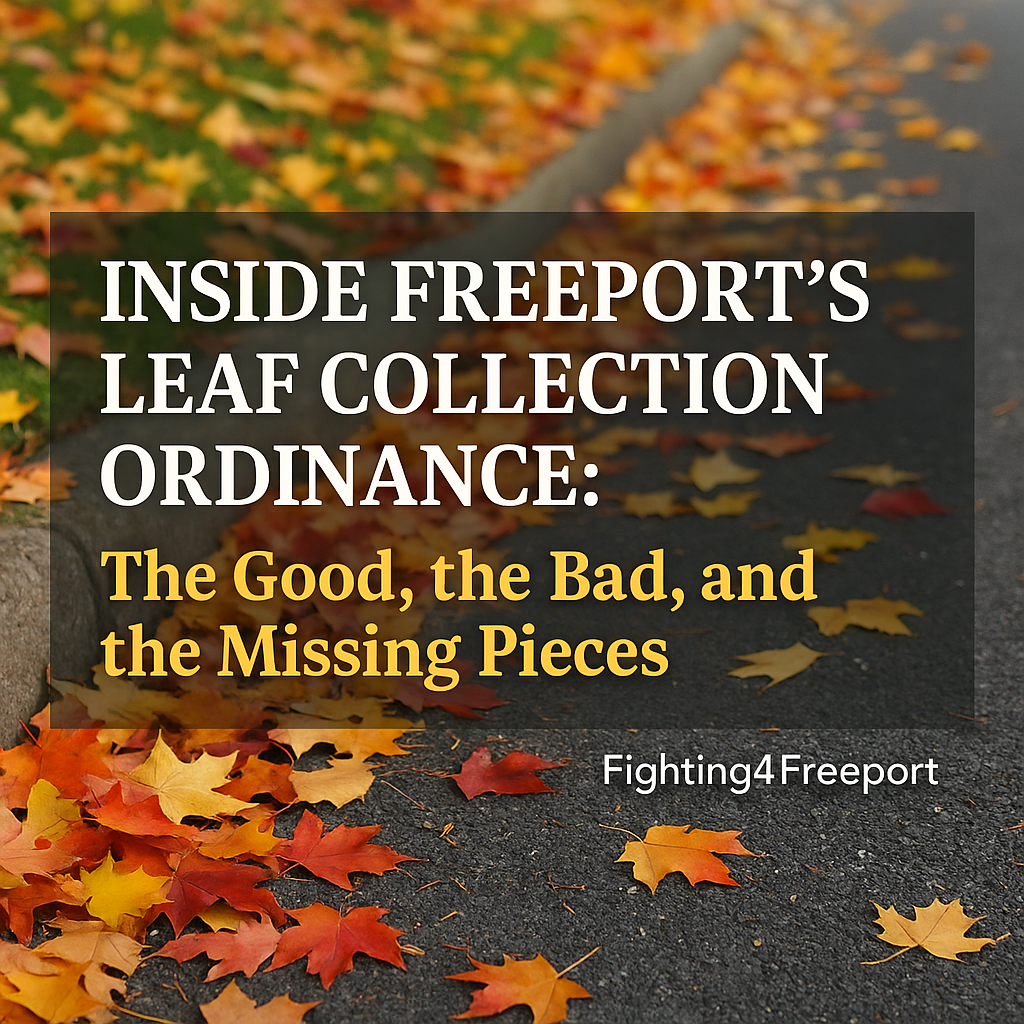Inside Freeport’s Leaf Collection Ordinance
FREEPORT, IL – November 04, 2025
Why This Matters
As the trees across Freeport trade their greens for golds, one of the most visible city services returns — curbside leaf collection. Each year, thousands of bags, piles, and wind-blown mounds appear along our streets. It’s a seasonal routine we take for granted, but behind it stands a small, often-overlooked piece of City Code: Section 1020.12.
This ordinance shapes how our city handles fallen leaves, what residents are allowed to do, and even who pays for it. But like many of Freeport’s ordinances, it tells only part of the story.
What the Ordinance Says
Freeport City Code Section 1020.12 – Depositing of Leaves on Curb Line for Collection allows residents to place fallen leaves along the curb for removal by the Division of Streets. Private-street residents may also request the service—if their streets are wide enough for collection trucks and if owners sign a waiver releasing the City from liability.
The law ensures private streets can be included at the same cost and on the same schedule as public ones, provided those safety conditions are met.
The Benefits
Freeport’s program provides clear community value:
Cleaner Streets & Storm Drains
Allowing curbside placement keeps storm drains clear, preventing flooding and improving water quality.Fair Access for Private Streets
Extending the service—at cost—to private streets helps maintain fairness and consistency citywide.Safety & Efficiency
Centralized pickup reduces leaf burning and illegal dumping, improving air quality and keeping streets safer.
The Shortcomings
While effective on the surface, the ordinance leaves one big question unanswered: what happens to the leaves after pickup?
There’s no mention of composting, mulching, or reuse. Without that guidance, it’s unclear whether the collected leaves become an asset or just another expense.
In contrast, neighboring communities like Rockford, DeKalb, and Madison have implemented composting or mulching programs that transform this “waste” into usable landscaping material—saving taxpayer dollars and promoting sustainability.
A Missed Opportunity
By failing to specify what happens post-collection, Freeport misses a chance to turn seasonal debris into community benefit.
Fighting4Freeport’s Recommendation:
The City should mulch and reuse collected leaves for municipal landscaping—parks, planters, and beautification projects—before offering any surplus mulch to residents, farmers, and community gardens at a low rate to offset collection and processing costs.
This would:
Reduce landscaping expenses;
Provide an affordable, eco-friendly resource to residents;
Demonstrate that city government can be both practical and environmentally responsible.
What Other Communities Do Right
Rockford, IL: Leaves are processed into compost for free spring pickup.
DeKalb, IL: The city partners with a composting facility and sells the product to fund operations.
Madison, WI: Maintains a full municipal compost program, using leaves to cut landfill waste and improve city gardens.
Freeport has the equipment, manpower, and need to do the same—it only lacks the policy direction.
Looking Ahead
Section 1020.12 was last amended in 2015. In the decade since, sustainability expectations and community priorities have evolved. Updating the ordinance to include a reuse clause would modernize it, reduce waste, and showcase smart stewardship of taxpayer dollars.
It’s not about rewriting the rulebook—it’s about closing the loop on a program we already pay for.
Call to the Community
Fighting4Freeport invites residents, neighborhood associations, and local farmers to share their thoughts.
Would you support a mulch-reuse program that turns Freeport’s fall cleanup into a sustainable, community-driven resource?
Comment below or email us at info@fighting4freeport.com — let’s help City Hall make common-sense improvements that turn piles of leaves into something we can all grow from.
Fighting4Freeport Opinion:
Freeport’s leaf collection ordinance is practical, but incomplete. Let’s turn “collection” into “connection” — between residents, sustainability, and smart government.








